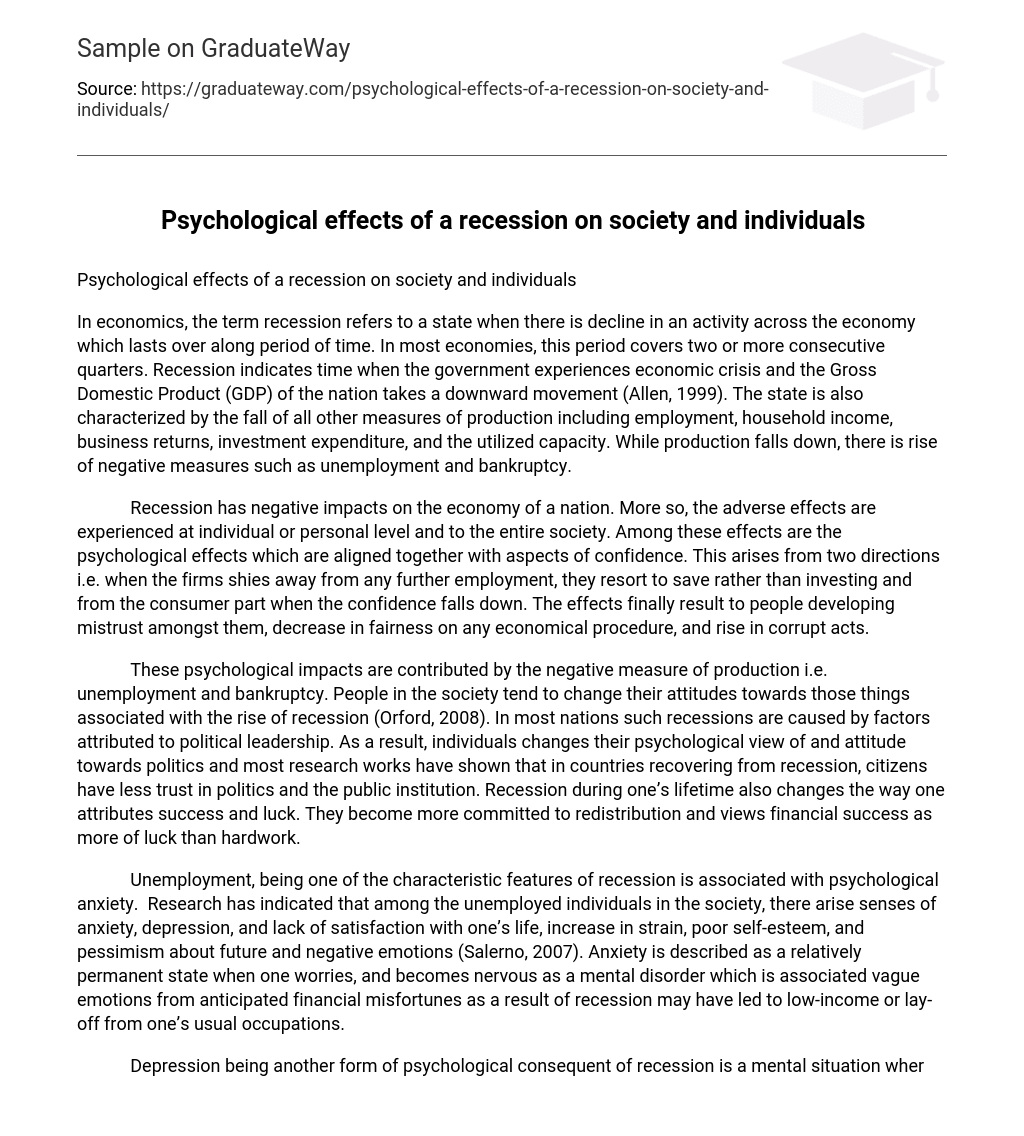In economics, the term recession refers to a state when there is decline in an activity across the economy which lasts over along period of time. In most economies, this period covers two or more consecutive quarters. Recession indicates time when the government experiences economic crisis and the Gross Domestic Product (GDP) of the nation takes a downward movement (Allen, 1999). The state is also characterized by the fall of all other measures of production including employment, household income, business returns, investment expenditure, and the utilized capacity. While production falls down, there is rise of negative measures such as unemployment and bankruptcy.
Recession has negative impacts on the economy of a nation. More so, the adverse effects are experienced at individual or personal level and to the entire society. Among these effects are the psychological effects which are aligned together with aspects of confidence. This arises from two directions i.e. when the firms shies away from any further employment, they resort to save rather than investing and from the consumer part when the confidence falls down. The effects finally result to people developing mistrust amongst them, decrease in fairness on any economical procedure, and rise in corrupt acts.
These psychological impacts are contributed by the negative measure of production i.e. unemployment and bankruptcy. People in the society tend to change their attitudes towards those things associated with the rise of recession (Orford, 2008). In most nations such recessions are caused by factors attributed to political leadership. As a result, individuals changes their psychological view of and attitude towards politics and most research works have shown that in countries recovering from recession, citizens have less trust in politics and the public institution. Recession during one’s lifetime also changes the way one attributes success and luck. They become more committed to redistribution and views financial success as more of luck than hardwork.
Unemployment, being one of the characteristic features of recession is associated with psychological anxiety. Research has indicated that among the unemployed individuals in the society, there arise senses of anxiety, depression, and lack of satisfaction with one’s life, increase in strain, poor self-esteem, and pessimism about future and negative emotions (Salerno, 2007). Anxiety is described as a relatively permanent state when one worries, and becomes nervous as a mental disorder which is associated vague emotions from anticipated financial misfortunes as a result of recession may have led to low-income or lay-off from one’s usual occupations.
Depression being another form of psychological consequent of recession is a mental situation where one becomes pessimistic and has a sense of inadequacy and a despondent lack of activity. This comes about when an individual spends more than the earning making him/her to be hopeless about the coming times by making assumption that whatever the possession; it cannot see the family through to unforeseen next source (Salerno, 2007).
Children from unemployed families have been found to perform poorly in schools because of socio-emotional problems, deviant behaviors, reduced aspiration and expectations and resulting from uttered words from their psychologically affected parents who are subjected by recession hence they become less sensitive. This will totally affect the future of the society.
Recession exposes one especially adults to chronic psychological stress which may start with self-destructive behavior like drug and drinks abuse, and gambling. This with the hot temper bring problems within relationships leading to break in family units thus exposing society to a lot tension and may totally stagnate in its process of recovering from such recession. Stress from members of the society results to recession fatigue which may advance to clinical depression. This will be evidenced when one develops behavior of reacting with anger and violence –this is seen when such people are involved in road carnage, domestic violence and crime and in the case of the entire may resolve into political violence.
The society especially the spouses of the unemployed men faces a lot of difficulties as these men try to manage the reduced income intended to be the family upkeep and such people will be under a lot of pressure to support the distressed partners and in dealing with intra-family conflicts. Self-blame is another psychological challenge facing individuals and society after an economic recession. This is evident when the root cause of the situation is being examined and here comes in this insidious reaction where people blame themselves for failing to anticipate the moment recession occurred and some strategies are laid to have been the remedies (Amick, 1995).
Bankruptcy being one of the parameters which rise during state of recession exposes an individual or even the entire society to untold psychological problems. One might feel helpless and this stage one should take professional advice than seeking help fro unscrupulous shylocks. The person is also get fixed to fall-back position, you feel like there is a back door to escape through, all these under psychological pressures. When one’s properties are seized to be sold to repay the debts, this may lead one getting stroke as a result of hopelessness and the associated shock. Even after recovering from bankruptcy when the economy starts to pick up, one thinking to fulfill life-long goals will seem too painful and hard. In all these situations of psychological effects, society takes the long term effects resulting from both recession and its effects on individuals.
References:
Allen, E, R. (1999). Financial crises and recession in the global economy. London: Edward Elgar Publishing
Amick, C. B. (1995). Society and health. OUP: Oxford University Press US
Berryman, C, J. (1985). The Psychological effects of unemployment. Leicester: University of Leicester, Department of Adult Education
Orford, J. (2008). Community psychology: challenges, controversies and emerging consensus. Hoboken: John Wiley and Sons
Salerno, J. T. (2007). Bankruptcy Litigation and Practice. Alphen: Aspen Publishers Online





